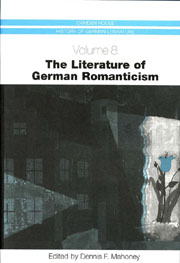Book contents
- Frontmatter
- Contents
- Illustrations
- Acknowledgments
- Abbreviations
- Introduction
- From “Romantick” To “Romantic”: The Genesis of German Romanticism in Late Eighteenth-Century Europe
- Goethe and the Romantic
- Early Romanticism
- From Goethe's Wilhelm Meister to anti-Meister Novels: The Romantic Novel between Tieck's William Lovell and Hoffmann's Kater Murr
- Tales of Wonder and Terror: Short Prose of the German Romantics
- The Romantic Drama: Tieck, Brentano, Arnim, Fouqué, and Eichendorff
- German Romantic Poetry in Theory and Practice: The Schlegel Brothers, Schelling, Tieck, Novalis, Eichendorff, Brentano, and Heine
- The Turn to History and the Volk: Brentano, Arnim, and the Grimm Brothers
- History and Moral Imperatives: The Contradictions of Political Romanticism
- Romanticism and Natural Science
- Gender Studies and Romanticism
- The Romantic Preoccupation with Musical Meaning
- Romanticism and the Visual Arts
- Goethe's Late Verse
- The Reception of German Romanticism in the Twentieth Century
- Works Cited
- Notes on the Contributors
- Index
The Romantic Preoccupation with Musical Meaning
Published online by Cambridge University Press: 05 February 2013
- Frontmatter
- Contents
- Illustrations
- Acknowledgments
- Abbreviations
- Introduction
- From “Romantick” To “Romantic”: The Genesis of German Romanticism in Late Eighteenth-Century Europe
- Goethe and the Romantic
- Early Romanticism
- From Goethe's Wilhelm Meister to anti-Meister Novels: The Romantic Novel between Tieck's William Lovell and Hoffmann's Kater Murr
- Tales of Wonder and Terror: Short Prose of the German Romantics
- The Romantic Drama: Tieck, Brentano, Arnim, Fouqué, and Eichendorff
- German Romantic Poetry in Theory and Practice: The Schlegel Brothers, Schelling, Tieck, Novalis, Eichendorff, Brentano, and Heine
- The Turn to History and the Volk: Brentano, Arnim, and the Grimm Brothers
- History and Moral Imperatives: The Contradictions of Political Romanticism
- Romanticism and Natural Science
- Gender Studies and Romanticism
- The Romantic Preoccupation with Musical Meaning
- Romanticism and the Visual Arts
- Goethe's Late Verse
- The Reception of German Romanticism in the Twentieth Century
- Works Cited
- Notes on the Contributors
- Index
Summary
Musical tones are beings who understand each other just as we do them: Johann Wilhelm Ritter (1776–1810), a young physicist in the orbit of the Jena circle of Romantics, made this rather eccentric proposition in a volume of literary fragments published posthumously in 1810. Arguing that no human relationship or story exists that could not be represented in music, Ritter suggests — even more provocatively — that, because of an inherent likeness of musical notes to human relationships, we can interact with tones (and they with us) just as we do with other people. Music can provide us with an idealized form of the relations we are missing in life — just as it can also become our seductress, leading us astray. Composers command an entire world analogous to the human, and the social orders they construct in music both reflect and influence life.
In these remarks, Ritter pushed to extremes a new conception of the power of instrumental music that had begun to hold sway in the last decades of the eighteenth century. The new appreciation was notably first expressed by critics who, like Ritter, were not themselves professional musicians. Wilhelm Heinrich Wackenroder (1773–98), Ludwig Tieck (1773–1853), Novalis (1772–1801), Friedrich Schiller (1759–1805), even Friedrich Schelling (1775–1854) — writers and thinkers occupied with what came to be known as the Geisteswissenschaften (“sciences of the spirit,” or Humanities) — all set down reflections on the subject.
- Type
- Chapter
- Information
- The Literature of German Romanticism , pp. 251 - 272Publisher: Boydell & BrewerPrint publication year: 2003



